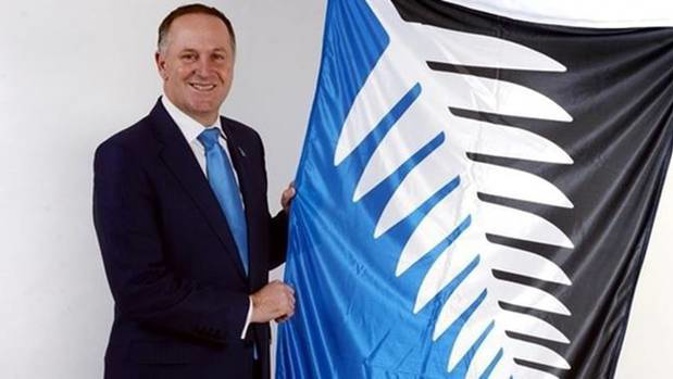
Sir John Key would not hold a flag referendum if he could have his time as Prime Minister again.
Instead, the country's former leader would simply change New Zealand's national flag and let the public love it or lump it.
"I think it's one of those things that all hell would have broken loose for a couple of months, then we would have worn it, gotten used to it and been proud of it," he told 66 Magazine's latest edition.
Key - the current chairman of ANZ Bank NZ - had been strongly in favour of changing the national flag in 2015 and 2016 when he was Prime Minister, preferring a black and white silver fern design to the current flag with its British Union Jack on it.
His Government spent $26 million and two years engaging with the public in a bid to bring about the change.
Two referendums were held; one choosing the best flag design and a second to decide whether it should replace the current flag.
Eventually, 56.6 per cent of Kiwi voters chose to keep the old flag in March 2016, compared with 43.2 per cent in favour of a new flag design.
Key was criticised for the cost of the process and starting a contentious debate that divided the country.
But he told 66 Magazine he would now bypass and do away with the debate and go straight for the flag change because New Zealand needed an iconic symbol.
"I still believe that, as a small country at the bottom of the world if we want people to know us, we need a symbol that is ours," he said.
He said his belief in New Zealand's need to stand out and forge its own future stemmed from advice from his late mother, Ruth.
"Mum always said you get out of life what you put into it. Yes, you need luck, but you also make your own luck."
In early 2015, a panel of prominent New Zealanders was appointed to oversee the process.
Some questioned the decision to include no designers on the 12-person panel, which was made up of ex-sportspeople, academics, advertising gurus and businesspeople.
More than 10,000 flag designs were submitted by the public, which the panel cut down to 40 alternative flags.
The shortlist was dominated by silver ferns and koru, though many retained the Southern Cross.
At that stage, opposition to a change intensified. Critics questioned the $26m cost of the referendum and the inadequate process.
Some sections of the public lamented the absence of a forward-thinking design in the final contenders.
The long list was trimmed to four flags, of which three featured silver ferns and one a koru. After a public campaign, a fifth contender, Red Peak, was added to the ballot.
In the first referendum in November and December, a black, white and blue silver fern flag was chosen as New Zealand's alternative national flag.
Turnout in the referendum was relatively low, at 48.78 per cent. About one in 10 votes was discarded, likely as a result of protest votes.
The silver fern flag, designed by Melbourne-based New Zealander Kyle Lockwood, was then flown in more than 250 sites across the country to help voters make up their minds.
As the second vote neared, the issue heated up.
The Change the Flag campaign ran advertisements featuring high-profile Kiwis, who urged voters to pick the silver fern design. Police investigated claims of vote-tampering.
The National Party was forced to deny its caucus was holding secret meetings to bolster support for a flag change. New Zealand First leader Winston Peters alleged voting papers had been wrongly translated.
Through it all, Key remained optimistic of a change, despite polls showing overwhelming support for the status quo. In the lead-up to the second referendum, he said that the issue was a "once in a lifetime" opportunity.
Eventually, the vote in the second referendum ended with 56.6 per cent to 43.2 per cent for the current national flag, with 2,124,507 people casting votes - a turnout of 67.3 per cent.
Take your Radio, Podcasts and Music with you









